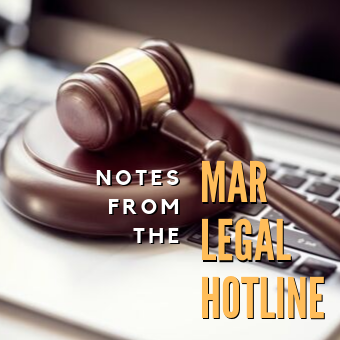Northeast Association of REALTORS®

Notes from the MAR Legal Hotline
I have a landlord client who wants to increase the rent on an occupied unit – can they do that?
Yes, a landlord in Massachusetts may increase the rent on an occupied unit, but the proper way to do that depends on whether the occupant is a tenant at will or has a lease agreement.
In the case of a tenant at will, a landlord must give the tenant a Notice to Raise the Rent no fewer than 30 days before the proposed increase will take effect. A longer notice is required in those situations in which a tenant pays rents at periods longer than monthly. The notice must be at least equal to a full rental period. Once a tenant has received the notice, they are not bound to pay the higher amount unless they accept the change. If the tenant does not agree to the higher rent payment, and does not voluntarily vacate the premises, the landlord must serve a 30-day Notice to Quit. To avoid delay in situations where a tenant does not agree to the higher rent, the landlord may serve the tenant with a Notice to Raise the Rent and a 30-day Notice to Quit simultaneously. This method terminates the existing tenancy and offers a new tenancy under the new terms.
Where a tenant has a lease agreement, a landlord may not unilaterally change the terms of the lease agreement. The landlord must wait until the end of the lease agreement to increase the rent or otherwise modify the terms of the lease agreement. If the tenant is not agreeable to the new terms, the tenant will be required to vacate the premises at the end of the existing lease. Typically, the lease agreement will dictate the timeframe in which the landlord and tenant must provide notice to the other regarding continuation and/or modification of the tenancy.
Landlords may never raise the rent or otherwise modify the terms of the tenancy for discriminatory or retaliatory reasons. Rent increases for tenants receiving housing assistance may need approval from the local housing authority.
What can I do to protect myself if I receive a lead paint disclosure form that was incorrectly filled out by the other side?
The hotline has been busy with this question. Keep in mind that it is equally important for both sides of a transaction to correctly complete the lead paint disclosure form. Regardless of whether you represent the seller or the buyer, if you receive a lead paint disclosure form with an error, you should contact the other side immediately to attempt to correct the form. If the other side is unresponsive, or unwilling to make edits, you should memorialize your communication with the other side in writing to create a record for use should an issue arise. Keep this documentation with the lead paint disclosure form in your files for easy access.
A common “error” we receive questions on is whether it is a problem if an “x” is placed where the sign says to “check.” The form says to check, so if you can check, you should follow the form’s instructions and use a check. If you are using an electronic platform where the only option is an “x” that is acceptable as long as it is clear what is being marked. A larger concern would be those situations where an “x” or “check” is placed where the form requires initials.
Penalties for non-compliance can be significant so be sure to explain to your clients the proper way to complete the form and correct any errors you find immediately.
Services provided through the Massachusetts Association of REALTORS® is intended for informational purposes and does not constitute legal advice, nor does it establish an attorney-client relationship. The Massachusetts Association of REALTORS®, by providing this service, assumes no actual or implied responsibility for any improper use of responses to questions through this service. The Massachusetts Association of REALTORS® will not be legally responsible for any potential misrepresentations or errors made by providing this service. For more information regarding these topics authorized callers should contact the MAR legal hotline at 800-370-5342 or e-mail at legalhotline@marealtor.com.
